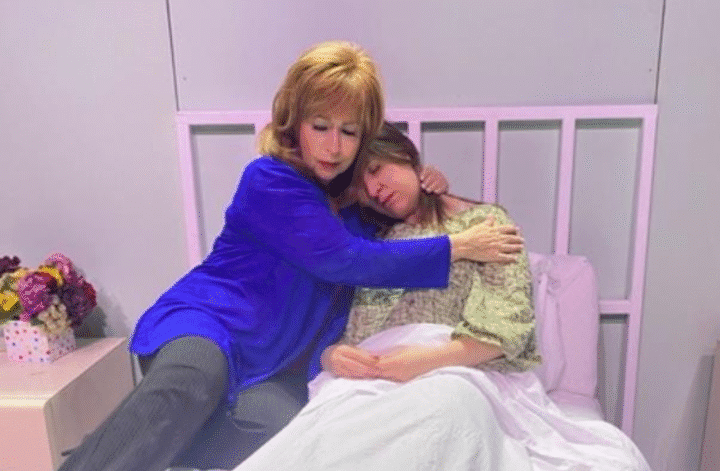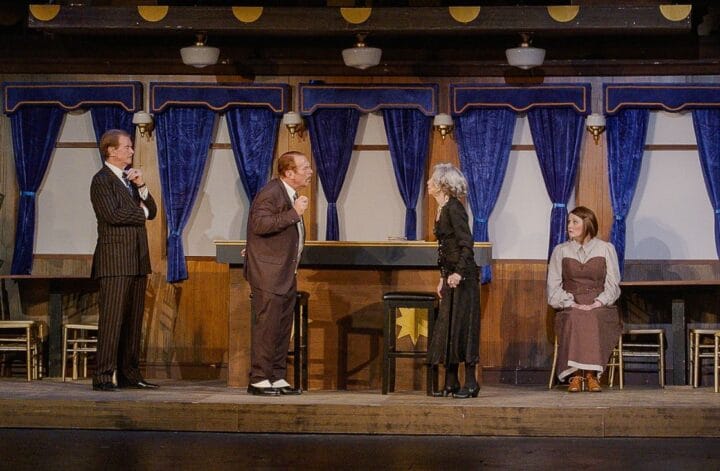There’s a reason why some stories become timeless classics. They tend to feature truths about the human condition that resonate anew for each generation. Pulitzer-prize-winning author Larry McMurtry’s novel about an intense, difficult yet devoted mother-daughter relationship, marital troubles, and issues with lovers called TERMS OF ENDEARMENT, became a literary sensation in 1975. His highly emotional-yet-relatable story gained cinematic fame when the 1983 movie-version won five Academy Awards, including Best Adapted Screenplay by James L. Brooks.
Popular Israeli-American writer/producer/director Dan Gordon then premiered his stage adaptation of the novel and movie at a UK tour in 2007. It arrived Off-Broadway in 2016 where it played to enthusiastic audiences and won critical acclaim. Broadway World called it “A theatrical gem . . . an enthralling, realistic portrayal of humankind with all of its affection, humor and conflict.” And Theatre is Easy wrote: “Dan Gordon’s brilliant rewriting of 1983’s blockbuster film of the same name takes the theater audience through 23 years of mother-daughter conflict and angst. There is not a wasted word.”
I jumped at the chance to see Curtain Call Playhouse’s (CCP) production of Terms of Endearment at the Pompano Beach Cultural Center last Sunday. Especially as it starred the award-winning 28-year-old company’s prolific founder/artistic director Kris Coffelt in the leading role of Aurora. The play debuted with only three performances last weekend but, fear not, they are returning to an even more intimate venue for this intense family drama: Fort Lauderdale’s beloved little blackbox theater, Empire Stage. Where they’ll be playing for three full weekends – from Friday January 30 through Sunday February 15.
The play opens to soft music (sound design & operation by Brenda Aulbach) and a flexible three-part stage set (Jack Coffelt set design with set dressing by Kris) dominated by Aurora Greenway’s (Kris Coffelt) central bedroom. A smaller apartment set for her young adult daughter, Emma Greenway (Heidi Bibler), sits stage right, and next-door neighbor Garrett Breedlove’s (Alan Goodman) fenced yard is stage left. This serene scene is quickly interrupted by the voiceover of an anxious mother complaining that she can’t hear the baby and something’s terribly wrong. A male voice tries, to no avail, to convince mom their infant is simply peacefully asleep. But she keeps on, finally shouting, “Emma!” and the woken baby starts wailing. Only then is the mother relieved.
We meet Aurora (the baby’s mom) as a widow of ten years, who now puts all her energy into perfecting her only daughter by obsessive criticism. Adult Emma manages to put up with her mother’s daily morning calls and advice, but we quickly realize she’s become too “nice” and obliging when she has trouble figuring out who she is and asserting her own needs. We cringe when Aurora confronts her daughter about her weight, her sloppy casual dress, and her drab hair (it’s obvious these are oft-repeated “observations”).

It’s especially painful when the night before her wedding, whilst Emma’s enjoying a fun “forbidden” joint with her bestie Patsy (Lauren Martino, who also makes brief appearances as Doris, a phone operator, and nurse), mom bangs on her door, insisting on a private conversation. She tells her daughter to call off her wedding to her high school sweetheart, Flap Horton (Alex Gomez), predicting disaster. “I am concerned you are making a mistake,” Aurora says. “Emma, you are not special enough to overcome a bad marriage.”
In a way, Emma needs this marriage to put space between her and her helicopter mom. (The play is set in the 1980s, way before “helicopter parenting” became part of the popular lexicon, but if the shoe fits …). They fight, Emma stands up for her choice of husband, and can’t believe her mother’s cruel timing. Aurora is invited not to attend her nuptials; she almost agrees (which would devastate Emma nonetheless) but only changes her mind so as not to waste her carefully selected mother-of-the-bride dress.
Yes, for most of Act 1, Aurora’s actions are continuously, selfishly, all about herself. To the point where when Emma tells her she’s pregnant, mom is happy for a minute … until she realizes that would make her “a grandmother” and “who wants to date a granny?” Why didn’t Emma consult her first?
It’s interesting how people can have intense personal reactions to different facets of this play, though many found lots to laugh at in Aurora’s over-the-top obsessive behavior. But for one theater-loving friend I’ve only known a few years but consider one of the kindest and socially considerate people I’ve ever met, Aurora’s obnoxious treatment of her daughter reminded her way too much of her own mother!
Nothing this straight-A student did was good enough for her mom; even boyfriends who were smart and kind were frowned upon if they weren’t also popular and good-looking. The popular captain of the football team wasn’t good enough because he wasn’t good looking. And his handsome teammate didn’t pass muster with mom because he was poor. She did end marrying the latter who, fortuitously, was also smart, loving and considerate. Then my friend made a point of raising their two children to be independent thinkers, proving there is hope for change in everyone – even those coming from corrosive early family environments.
Her comments got me thinking about my own over-overprotective mom who, like Aurora, often criticized my looks and “unladylike” demeanor. But I was lucky to have a dad who loved me unconditionally and supported me intellectually, so I hadn’t given my early mother-daughter conflicts much thought … up till now. Be prepared for some deep reflections into your past.
For me, the huge trigger arrived in Act 2. When always perfectly groomed and proper Aurora loses it completely upon being confronted with a blasé diagnosis of her daughter’s critical condition by careless, insensitive Dr. Maise (Bob Sharkey).
Most of us can sympathize – having, at one time or another, dealt with callously disinterested medical staff. Due to a tragic personal experience of incompetency at Broward General’s cardiac department some 30 years ago, I found myself cheering Aurora on in her ferocious maternal explosion. (I’d almost been banned from the hospital’s critical care unit when I insisted on being heard. Sadly, my outrage at my husband’s inattentive treatment proved justified and I curse the carelessness of the hospital’s heart surgeons to this day.)

Goodman as Garrett, the sexy ex-astronaut next door.
Sometimes it takes a life-and-death crisis to bring out the best in people. Hopefully, before it’s too late. Sweet Emma had encouraged her mom to finally allow herself to date and, after a lean decade of widowhood, have sex with the handsome former-astronaut next door. And while Aurora completely falls for Garrett (Alan Goodman), the lifelong casual “player” can’t readily admit “she’s the one,” although he does see her as special. Nevertheless, he totally steps up (there’s personal growth here too) and stays lovingly at her side when she’s crushed by her daughter’s sudden cancer diagnosis. Then Garrett employs every trick in his playbook – both legal and illegal – to get Emma admitted into an experimental treatment program.
The finely tuned craft exhibited by all the show’s actors was flawless; we can also credit the inspired guidance of guest director John Hernandez, who also served as lighting designer. I’m actually glad I never saw the movie, because now I’ll always remember these characters as Curtain Call’s cast. Kris Coffelt made a perfect Aurora; I’m not surprised she listed her in the program as a favorite “special” role. She also wore the most beautiful collection of elegant suits, dresses and lingerie.
I wanted to credit her costume designer, and wondered if she can keep some outfits, but then saw the program cites “props, costumes” as provided by the cast. Well, she does have excellent taste! I will note Susan Lloyd served as a highly efficient dresser. Of course, Coffelt landed all her snarky, humorous remarks expertly in Act 1, but I felt Act 2’s emotional outburst against the doctor and ensuing, crushing grief that brought her – and the entire audience – to tears were show-stopper standouts that will be remembered for a long time to come.




